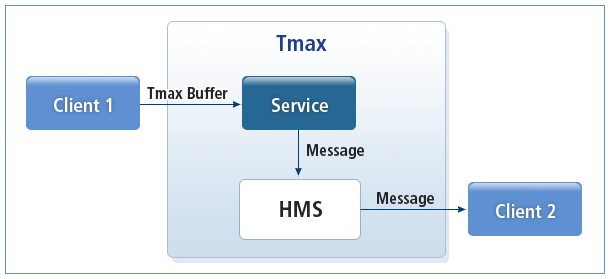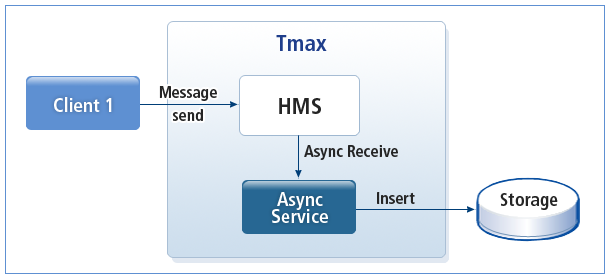다음은 클라이언트와 서버에서 HMS API를 사용하여 메시지를 주고받는 간단한 프로그램 흐름이다.
-
클라이언트(Client1)는 string 타입의 버퍼에 입력된 문자열을 복사해서 서비스를 호출한다.
-
서버의 서비스 루틴에서는 이 문자열을 받아서 소문자를 대문자로 변경한 뒤 HMS로 메시지를 전송한다.
-
클라이언트(Client2)는 일정 시간이 지난 뒤 HMS로부터 메시지를 수신받는다.
다음은 HMS 환경설정 파일 예제이다.
*DOMAIN
hms SHMKEY = 74347,
TPORTNO = 8808
*NODE
Locke2 TMAXDIR ="/home/tmax5/tmax",
APPDIR ="/home/tmax5/tmax/appbin/",
MAXSESSION = 100
*SVRGROUP
hms01 NODENAME = "Locke2", CPC = 1, SVGTYPE = "HMS", RESTART = Y,
OPENINFO = "ORACLE_XA+Acc=P/scott/tiger+SesTm=60",
HMSINDEX = 2, HMSMSGLIVE = 1, HMSMAXTHR = 2, HMSMAXDBTHR = 5,
HMSNAME = hms_ora
svg1 NODENAME = "Locke2"
*HMS
queue01 SVGNAME = hms01, BOOT = "WARM", TYPE = "QUEUE"
topic01 SVGNAME = hms01, BOOT = "WARM", TYPE = "TOPIC"
*SERVER
svr SVGNAME = svg1
*SERVICE
SVC SVRNAME = svr
다음은 클라이언트 프로그램 예제이다.
#include <stdio.h>
#include <stdlib.h>
#include <unistd.h>
#include <string.h>
#include <usrinc/atmi.h>
#include <usrinc/hmsapi.h>
int main(int argc, char **argv)
{
char *sndbuf, *rcvbuf;
long rcvlen, sndlen;
HMS_SHND *sess;
HMS_CHND *cons;
hms_msg_t *msg;
if (argc != 2) {
printf("Usage : %s <message>\n\n", argv[0]);
exit(1);
}
if (tmaxreadenv("tmax.env", "TMAX") == -1) {
printf("error: tmaxreadenv() failed - %d\n", tperrno);
exit(1);
}
if (tpstart((TPSTART_T *) NULL) == -1) {
printf("error: tpstart() fail - %d\n", tperrno);
exit(1);
}
if ((sndbuf = (char *)tpalloc("STRING", NULL, 0)) == NULL) {
printf("error: sendbuf alloc failed !\n");
tpend();
exit(1);
}
if ((rcvbuf = (char *)tpalloc("STRING", NULL, 0)) == NULL) {
printf("error: recvbuf alloc failed !\n");
tpfree((char *)sndbuf);
tpend();
exit(1);
}
strcpy(sndbuf, argv[1]);
if(tpcall("SVC", sndbuf, 0, &rcvbuf, &rcvlen, 0)==-1){
printf("error: Can't send request to service SVC\n");
tpfree((char *)sndbuf);
tpfree((char *)rcvbuf);
tpend();
exit(1);
}
sleep(5);
/* RECV MESSAGE FROM HMS */
if ((sess = hms_create_session("hms01", 0, HMS_AUTO_ACK, 0)) == NULL) {
printf("error: hms_create_session() failed tperrno = %d\n", tperrno);
tpend();
exit(1);
}
if ((cons = hms_create_receiver(sess, "queue01", "cons01", NULL, NULL, 0))
== NULL) {
printf("error: hms_create_receiver() failed tperrno = %d\n", tperrno);
tpend();
exit(1);
}
/* ALLOCATION */
if ((msg = hms_alloc(sess, 1024)) == NULL) {
printf("error: hms_alloc() failed tperrno = %d\n", tperrno);
tpend();
exit(1);
}
/* RECV MESSAGE */
if (hms_recvex(cons, &msg, 5, 0) == -1) {
printf("error: hms_recvex() failed tperrno = %d\n", tperrno);
hms_free(msg);
tpend();
exit(1);
}
/* GET BODY */
rcvlen = 1024;
if (hms_get_body(msg, rcvbuf, &rcvlen) == -1) {
printf("error: hms_get_body() failed tperrno = %d\n", tperrno);
hms_free(msg);
tpend();
exit(1);
}
printf("HMS MESSAGE : %s\n", rcvbuf);
/* CLOSE RECEIVER */
if (hms_close_receiver(cons, 0) == -1) {
printf("error: hms_close_receiver() failed tperrno = %d\n", tperrno);
hms_free(msg);
tpend();
exit(1);
}
/* CLOSE SESSION */
if (hms_close_session(sess, 0) == -1) {
printf("error: hms_close_session() failed tperrno = %d\n", tperrno);
hms_free(msg);
tpend();
exit(1);
}
hms_free(msg);
tpend();
return 0;
}
다음은 서버 프로그램의 예제이다.
<svr.c>
#include <stdio.h>
#include <stdlib.h>
#include <usrinc/atmi.h>
#include <usrinc/hmsapi.h>
HMS_SHND *sess = NULL;
HMS_CHND *prod = NULL;
int tpsvrinit(int argc, char **argv)
{
while(1) {
sess = hms_create_session("hms01", 0, HMS_AUTO_ACK, 0);
if (sess != NULL) {
break;
}
if (tperrno != TPENOREADY) {
printf("hms_create_session(hms01) : FAIL tperrno = %d\n", tperrno);
return -1;
}
}
prod = hms_create_sender(sess, "queue01", "prod_svc", 0);
if (prod == NULL) {
printf("hms_create_sender() : FAIL tperrno = %d\n", tperrno);
return -1;
}
return 1;
}
int tpsvrdone()
{
hms_close_sender(prod, 0);
hms_close_session(sess, 0);
return 1;
}
SVC(TPSVCINFO *msg)
{
int n, i;
hms_msg_t *hmsmsg = NULL;
char *data = msg->data;
int len = msg->len, asize;
printf("SVC STARTED!\n");
/* TOUPPER */
for (i = 0; i < len; i++)
data[i] = toupper(data[i]);
/* ALLOCATION */
asize = len +1024;
hmsmsg = hms_alloc(sess, asize);
if (hmsmsg == NULL) {
printf("hms_alloc : fail tperrno = %d\n", tperrno);
tpreturn(TPFAIL, 0, NULL, 0, 0);
}
/* SET BODY */
n = hms_set_body(hmsmsg, data, len);
if (n < 0) {
hms_free(hmsmsg);
printf("hms_set_body : fail tperrno = %d\n", tperrno);
tpreturn(TPFAIL, 0, NULL, 0, 0);
}
/* SEND : hms01, persistent */
n = hms_sendex(prod, hmsmsg, HMS_DLV_PERSISTENT, 0, 0, 0);
if (n < 0) {
hms_free(hmsmsg);
printf("hms_sendex(prod) : fail tperrno = %d\n", tperrno);
tpreturn(TPFAIL, 0, NULL, 0, 0);
}
/* FREE */
hms_free(hmsmsg);
printf("SVC SUCCESS!\n");
tpreturn(TPSUCCESS, 0, NULL, 0, 0);
}
클라이언트/서버 프로그램은 Tmax 애플리케이션을 컴파일하는 과정과 동일하게 컴파일한다.
참고
프로그램 컴파일에 대한 자세한 내용은 "Tmax Application Development Guide"를 참고한다.

